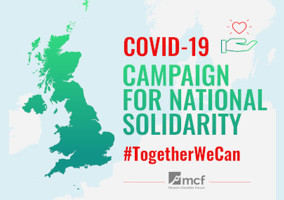Islamic Relief has raised more though this year's Ramadan appeal than last year, despite not being able to conduct any in-person fundraising activity.
Speaking during a panel discussion at the Chartered Institute of Fundraising's Annual Convention, Tufail Hussain, director of Islamic Relief UK, said that the charity had a “record” Ramadan this year and raised 30% more than last year.
The month of Ramadan ran between 23 April and 23 May this year and is a busy period for Muslim charities, which often raise a high percentage of their total income during that month. Events and bucket collections at mosques are a key source of revenue. Lockdown disrupted hundreds of fundraising activities that had been planned for months.
Digital fundraising resulted in a wider audience
Hussain said that when it became clear that in-person fundraising would not be possible, the charity had to quickly pivot to digital, which allowed it to reach more donors than in the past.
He said: “We did see a drop in the average value of donations. However, by engaging digital channels, we were suddenly able to reach a wider audience. And we saw a 30% increase in the amount of people that donated to Islamic Relief during the month of Ramadan.”
He said that key elements of the success were partnerships with social media influencers, and the effort of citizen fundraisers. Volunteer fundraisers organised by regional Islamic Relief teams created more than 500 fundraising pages and raised £465,000 in total.
The charity had previously raised £12m through its 2019 Ramadan appeal.
Last month, initial data from various Muslim charities indicated that for many charities, fundraising during Ramadan was more successful than expected, considering the challenges of lockdown. Many managed to replicate or improve their 2019 results by moving their activities online. However, smaller charities that did not have the resources to go digital did suffer.
International causes did not suffer
The panel also discussed whether the crisis has made people more reluctant to help and donate to charities with a global remit, when there is a big focus on supporting people in the UK and in local communities.
Hussain said that this did not seem to be the case at Islamic Relief. He said supporters were keen to do more to help in the UK, but that international causes did not suffer, with its Yemen appeal performing better than expected.
He said: “We've definitely seen an increase in awareness and a desire to do more in the UK, but certainly not seen a decrease in support for international causes. If anything, we've seen an increase in compassion.
“Yemen is a cause that we've traditionally found difficult to fundraise for. Post-Ramadan, during our quietest fundraising period, there was an online movement on social media to raise awareness about Yemen within the Muslim community. This led to a fundraising drive online that saw social media channels and influencers starting to raise money for Yemen.
“We raised over £1m, in a moment when it’s normally difficult for us to fundraise.”
‘Donors are predicting a humanitarian crisis’
Other panellists agreed that while there has been a shift towards helping in people’s own communities, the focus on digital has also broadened the perspective.
Sarah Vibert, director of policy and volunteering at NCVO, said that while many people volunteered locally and created mutual aid groups, there was also a shift to online volunteering, which can be done from anywhere.
She said: “There is something about how you create that community and move it online which doesn't necessarily need to be about physical proximity.”
Mark Phillips, managing director at Bluefrog fundraising consultancy, said that donors seem keen to donate to development charities, as long as they have a clear sense of what they are supporting.
He said: “There's a sense that there's a lack of leadership. In the short term, the focus is very much on wanting to be part of something.
“At the beginning, it was all about the disease. Now, it's all about how the economic impact is going to hit us, not just here, but globally as well.
“Donors are already predicting a humanitarian crisis. We've got people who don't normally give to development charities saying that they're going to start giving. But they want to give it to an end.
“And rather than just give, they want some direction. What are we looking to achieve? What do we want to do?”












